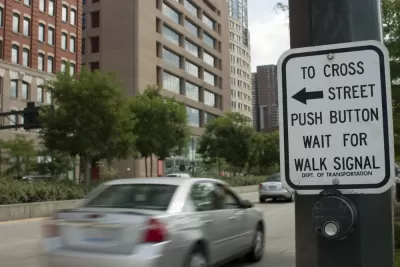Benjamin Ross argues that the walk signal is a fundamentally flawed approach to creating walkable streets and shareable roadways—making walking slower, less convenient, and more dangerous.

Walk signals are meant to make walking safer by sending cars and pedestrians ahead at different times. That means different types of road users receive different sets of information and instructions.
To make streets truly pedestrian-friendly, Benjamin Ross argues, it may be time to rethink that strategy.
"The underlying principle," he says, is that "negotiating the use of shared space makes roads safer."
Ross argues for letting drivers and pedestrians traveling the same direction go at the same time. That kind of system would treat various modes of transportation equally, he says, whereas the timer common to walk signals unfairly pushes pedestrians off the road in favor of drivers.
"Restricting the right to cross the street is intrinsically dangerous," Ross cautions: It teaches users of the road that they have to look out to drivers, but drivers don't have to look out for them.
This piece is part of a three-part series at Greater Greater Washington.
FULL STORY: Walk signals are bad for walking

Maui's Vacation Rental Debate Turns Ugly
Verbal attacks, misinformation campaigns and fistfights plague a high-stakes debate to convert thousands of vacation rentals into long-term housing.

Planetizen Federal Action Tracker
A weekly monitor of how Trump’s orders and actions are impacting planners and planning in America.

San Francisco Suspends Traffic Calming Amidst Record Deaths
Citing “a challenging fiscal landscape,” the city will cease the program on the heels of 42 traffic deaths, including 24 pedestrians.

Adaptive Reuse Will Create Housing in a Suburban Texas Strip Mall
A developer is reimagining a strip mall property as a mixed-use complex with housing and retail.

Study: Anti-Homelessness Laws Don’t Work
Research shows that punitive measures that criminalized unhoused people don’t help reduce homelessness.

In U.S., Urban Gondolas Face Uphill Battle
Cities in Latin America and Europe have embraced aerial transitways — AKA gondolas — as sustainable, convenient urban transport, especially in tricky geographies. American cities have yet to catch up.
Urban Design for Planners 1: Software Tools
This six-course series explores essential urban design concepts using open source software and equips planners with the tools they need to participate fully in the urban design process.
Planning for Universal Design
Learn the tools for implementing Universal Design in planning regulations.
Heyer Gruel & Associates PA
JM Goldson LLC
Custer County Colorado
City of Camden Redevelopment Agency
City of Astoria
Transportation Research & Education Center (TREC) at Portland State University
Jefferson Parish Government
Camden Redevelopment Agency
City of Claremont





























